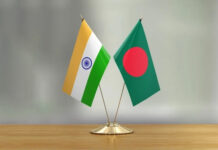Democracy’s ice age, bureaucracy’s golden age
 A survey run by Dhaka University’s department of development studies and researchers of three universities in the UK and Denmark stated that 95 per cent of the government officers and employees claim that they are committed to public service. But in reality, the researchers said, only 57 per cent are actually enthusiastic about their work (Prothom Alo 8 March 2019).
A survey run by Dhaka University’s department of development studies and researchers of three universities in the UK and Denmark stated that 95 per cent of the government officers and employees claim that they are committed to public service. But in reality, the researchers said, only 57 per cent are actually enthusiastic about their work (Prothom Alo 8 March 2019).
Any survey or study is not a pathological report that it is a hundred per cent correct. But a neutral survey does give a more or less reliable picture. In this case, the 57 per cent could be 52 per cent of 62 per cent. The bottom line is, according to the survey, most of the government officials lack interest in serving the people. This is a matter of concern for a developing country. If over half of the officials in the public administration lack sincerity, competence and ethics, that means the people will be deprived of the services to which they are entitled and development initiatives will not be sustainable.
On average, the people of Bangladesh have no lacking in merit and those who pass the public service exams are above average. So why is the bureaucracy riddled with inefficiency and weakness? Had normal democratic politics existed in the country, then the bureaucracy wouldn’t have been in such a deplorable state. Corrupt politics gives priority to nepotism and politicisation over merit, competence and honesty.
The Prothom Alo report stated that several researchers and former secretaries said the overall quality and professionalism of the public administration was not satisfactory. Politicisation was an obstacle to increasing work ethic and professionalism.
Nepotism in the Bengali society existed even during the British rule, it increased during Pakistan times and has been on a steady upward curve since independence. Bengali leaders are full of self-praise and abhor any form of criticism. They do not like to admit they are wrong, even if anyone points out their errors. For example, the newly appointed state minister for public administration has brushed off the survey’s remarks on nepotism and politicisation as totally baseless. He told Prothom Alo that they follow the policy of posting the right person to the right place. The recent elections prove his words to be only too true!
The competence and efficiency of the ICS officers and those of the revenue cadres during the British time could never be questioned. Even so, when the change of power was imminent, many of them began sidling close to Mahatma Gandhi, Pundit Nehru and Muhammad Ali Jinnah. These officers were given choice postings after the independence of Pakistan and India. After the six-point demand became popular, not before that, many civil servants started inching towards Awami League. If they were given vital positions after independence, that cannot be called politicisation. It was from the nineties that the people of Bangladesh were assailed with unrestricted spree of nepotism and politicisation. Now it is taken for granted, an ailment for which there is no cure.
Our politicians have the propensity to blame the bureaucracy for anything and everything. They never spare a moment for introspection. But there is need for reforms in the administration. An initiative in this regard was taken after Bangladesh became independent, but to no avail. During the Bangladesh Krishak Sramik Awami League (BKSAL), the district governor post was created to place a political person over the deputy commissioner so that the government officials could not misuse their power. But this system was nipped in the bud and the government officials breathed a sigh of relief.
The leaders of all governments have called for administrative reforms, though they never have really managed to emerge from the existing cycle. All public leaders of the country have a propensity towards colonial-bashing. At a party meeting on 7 November 1979, president Ziaur Rahman said that the society, administrative structure and old laws of of colonial times cannot continue to Bangladesh. The words may have sounded good and revolutionary, but the meaning boiled down to nothing. Such words would be relevant if uttered by a leader following the Russian revolution of the communist revolution in China.
Ziaur Rahman wanted to create an administration to suit an independent country, and created the post of district coordinator in each district. But this was done without specifying any rank, office or responsibility. This served to please a section of people’s representatives, but invoked fear among the bureaucrats.
Political leaders are never happy with bureaucrats. On 29 January 1980, Awami League leader Mizanur Rahman Chowdhury said, ‘We are still ruled by outdated colonial laws. An independent country and nation cannot run in this manner. At present, elected representatives have no power. All power lies in the hands of the bureaucrats.”
And then Ershad came onto the scene. He spoke of empowering the people and introduced the upazila system. Then when Khaleda Zia took over power, she rejected this system because anything that Ershad did must be bad. And in the present upazila system, the only one who benefits is the upazila chairman, not the people.
When politics is in its ice age and democracy is in chaos, then it is the golden age for bureaucracy. The prevailing system is as responsible for the lack of efficiency and competence in the administration as are the civil servants themselves. Poor standard of education, the quota system, weak selection process and other factors have lead to the lack of qualified people in the cadre service.
Despite everything, there are still honest and hard working people at the district and upazila levels. But it is difficult for them to function freely. The threat of being made OSD constantly hangs over their heads, robbing them of a decent night’s sleep. They are human, after all. They have their families to care for.
It is not that most of the officers in the administration are unwilling to serve the public, but if they are obliged to please the powers that be, when will they get the time to serve the people? When a so-called people’s representative is fully aware that all credit for his election results goes to the relevant government official, not himself or his party supporters, how can he expect morality or integrity from them? Only when good governance backed by democracy is established, will the administration be able to overcome all of its weaknesses.
- Syed Abul Maksud is a writer and researcher. This piece appeared in Bangla in the print version of Prothom Alo and has been rewritten here in English by Ayesha Kabir









